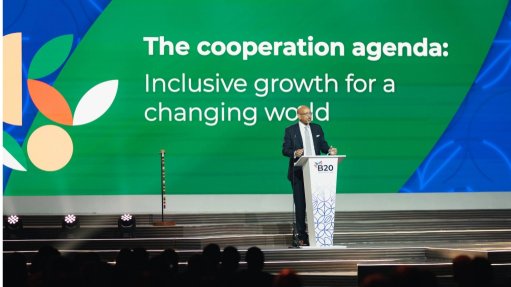Seifsa concerned about artisan levels in South Africa
Industry organisation the Steel and Engineering Industries Federation of Southern Africa (Seifsa) human capital and skill development executive Zizile Lushaba emphasises that a functioning economy must have a sufficient number of artisans if it is to fulfil its economic potential.
“From energy and water to transport and logistics, all key sectors of the economy are dependent on a ready supply of artisans,” she avers.
“Although South Africa remains woefully short of artisan skills, this reality is no stranger to the South African government. In November 2022, Higher Education, Science and Innovation Minister Dr Blade Nzimande warned that South Africa needs at least 60% of school leavers to pursue training in a trade to meet the country’s demand for scarce skills,” Lushaba adds.
She says that the Department of Home Affairs has also made a concerted effort to attract critical skills to the country by adding seven trades to the latest critical skills list, which was released in August 2022.
The inclusion of trades in the critical skills list highlights the shortage of these skills and affords foreign nationals with these skills an opportunity to apply for critical skills work visas, Lushaba explains.
“This may appear contradictory, when considering the country’s unacceptably high levels of unemployment; however, the issue is that these are skills the economy urgently needs and are not readily available locally,” she clarifies.
She points out that President Cyril Ramaphosa, in his State of the Nation Address in February, said: “One of the key ingredients for economic growth and competitiveness is the ability to attract skills which the economy needs. Having completed a comprehensive review of the work visa system, we will move quickly to implement the recommendations put forward.”
According to the requirements of the government’s National Development Plan (NDP) and White Paper for Post-School Education and Training, South Africa should be producing 30 000 qualified artisans a year by 2030.
“This will remain a pipe dream if there is no synergy, strategy and agreed action plan between the main role-players to see the Decade of the Artisan campaign being achieved,” Lushaba warns.
She posits that South Africa faces two main problems when it comes to the shortage of artisans. Firstly, older experienced artisans who are over the age of 55 are retiring, while those in their 30s and 40s are taking advantage of the global portability and demand for their skills and emigrating.
Moreover, the 36.5% decline in the total number of learners who entered artisanal learning programmes during the 2020/21 financial year is also a major concern, Lushaba points out.
Secondly, and compounding the problem further, is that younger newly qualified artisans lack the experience to substitute the skilled people leaving the country.
Moreover, the country’s poor-quality formal education system produces matriculants who lack the maths and science literacy required to get to grips with the demands of many trade programmes, Lushaba argues.
She says this leaves the country with a gap in the market of about 20 years and no pipeline of younger suitably qualified artisans ready to join the workforce, build their careers and contribute to economic growth.
For the country to produce what the National Artisan and Apprenticeship Development Strategy 2030 dubbed as the Twenty-first Century Artisan (A21), there needs to be a functional system that ensures exposure for learners in artisanal programmes to the theoretical aspect of their trade; simulation (practical) and experiential learning (on-the-job training); and a clear acknowledgment that one or two parts of these components is simply inadequate – all artisans in training need immersion in all these aspects to eventually become A21 Artisans, Lushaba outlines.
For this process to succeed, Lushaba calls for a strong ongoing partnership between three crucial role-players – industry and workplaces; sector education and training authorities; and skills development providers and reputable training centres, such as the Seifsa Training Centre.
Lushaba adds that government also plays a major overarching role, in that it needs to be the glue that binds these three important stakeholders together by providing the necessary regulatory and enabling framework.
Article Enquiry
Email Article
Save Article
Feedback
To advertise email advertising@creamermedia.co.za or click here
Comments
Press Office
Announcements
What's On
Subscribe to improve your user experience...
Option 1 (equivalent of R125 a month):
Receive a weekly copy of Creamer Media's Engineering News & Mining Weekly magazine
(print copy for those in South Africa and e-magazine for those outside of South Africa)
Receive daily email newsletters
Access to full search results
Access archive of magazine back copies
Access to Projects in Progress
Access to ONE Research Report of your choice in PDF format
Option 2 (equivalent of R375 a month):
All benefits from Option 1
PLUS
Access to Creamer Media's Research Channel Africa for ALL Research Reports, in PDF format, on various industrial and mining sectors
including Electricity; Water; Energy Transition; Hydrogen; Roads, Rail and Ports; Coal; Gold; Platinum; Battery Metals; etc.
Already a subscriber?
Forgotten your password?
Receive weekly copy of Creamer Media's Engineering News & Mining Weekly magazine (print copy for those in South Africa and e-magazine for those outside of South Africa)
➕
Recieve daily email newsletters
➕
Access to full search results
➕
Access archive of magazine back copies
➕
Access to Projects in Progress
➕
Access to ONE Research Report of your choice in PDF format
RESEARCH CHANNEL AFRICA
R4500 (equivalent of R375 a month)
SUBSCRIBEAll benefits from Option 1
➕
Access to Creamer Media's Research Channel Africa for ALL Research Reports on various industrial and mining sectors, in PDF format, including on:
Electricity
➕
Water
➕
Energy Transition
➕
Hydrogen
➕
Roads, Rail and Ports
➕
Coal
➕
Gold
➕
Platinum
➕
Battery Metals
➕
etc.
Receive all benefits from Option 1 or Option 2 delivered to numerous people at your company
➕
Multiple User names and Passwords for simultaneous log-ins
➕
Intranet integration access to all in your organisation





















